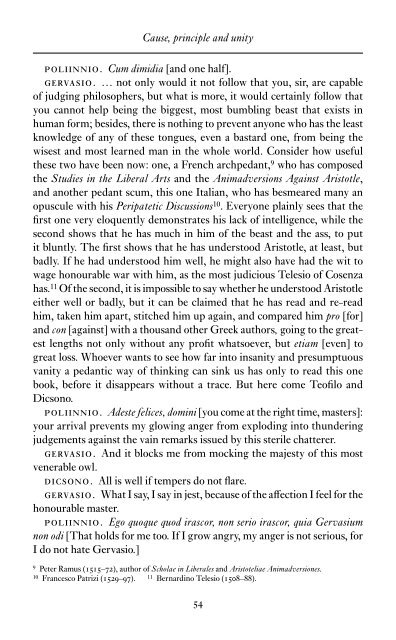Create successful ePaper yourself
Turn your PDF publications into a flip-book with our unique Google optimized e-Paper software.
<strong>Cause</strong>, principle and unity<br />
POLIINNIO. Cum dimidia [and one half].<br />
GERVASIO. … not only would it not follow that you, sir, are capable<br />
of judging philosophers, but what is more, it would certainly follow that<br />
you cannot help being the biggest, most bumbling beast that exists in<br />
human form; besides, there is nothing to prevent anyone who has the least<br />
knowledge of any of these tongues, even a bastard one, from being the<br />
wisest and most learned man in the whole world. Consider how useful<br />
these two have been now: one, a French archpedant, 9 who has composed<br />
the Studies in the Liberal Arts and the Animadversions Against Aristotle,<br />
and another pedant scum, this one Italian, who has besmeared many an<br />
opuscule with his Peripatetic Discussions 10 . Everyone plainly sees that the<br />
first one very eloquently demonstrates his lack of intelligence, while the<br />
second shows that he has much in him of the beast and the ass, to put<br />
it bluntly. The first shows that he has understood Aristotle, at least, but<br />
badly. If he had understood him well, he might also have had the wit to<br />
wage honourable war with him, as the most judicious Telesio of Cosenza<br />
has. 11 Of the second, it is impossible to say whether he understood Aristotle<br />
either well or badly, but it can be claimed that he has read and re-read<br />
him, taken him apart, stitched him up again, and compared him pro [for]<br />
and con [against] with a thousand other Greek authors, going to the greatest<br />
lengths not only without any profit whatsoever, but etiam [even] to<br />
great loss. Whoever wants to see how far into insanity and presumptuous<br />
vanity a pedantic way of thinking can sink us has only to read this one<br />
book, before it disappears without a trace. But here come Teofilo and<br />
Dicsono.<br />
POLIINNIO. Adeste felices, domini [you come at the right time, masters]:<br />
your arrival prevents my glowing anger from exploding into thundering<br />
judgements against the vain remarks issued by this sterile chatterer.<br />
GERVASIO. And it blocks me from mocking the majesty of this most<br />
venerable owl.<br />
DICSONO. All is well if tempers do not flare.<br />
GERVASIO. What I say, I say in jest, because of the affection I feel for the<br />
honourable master.<br />
POLIINNIO. Ego quoque quod irascor, non serio irascor, quia Gervasium<br />
non odi [That holds for me too. If I grow angry, my anger is not serious, for<br />
I do not hate Gervasio.]<br />
9 Peter Ramus (1515–72), author of Scholae in Liberales and Aristoteliae Animadversiones.<br />
10 Francesco Patrizi (1529–97). 11 Bernardino Telesio (1508–88).<br />
54

















